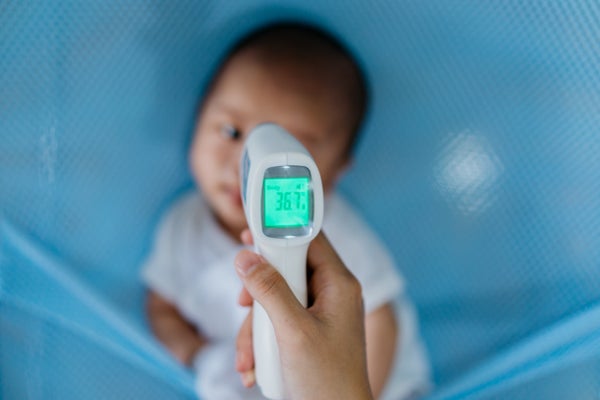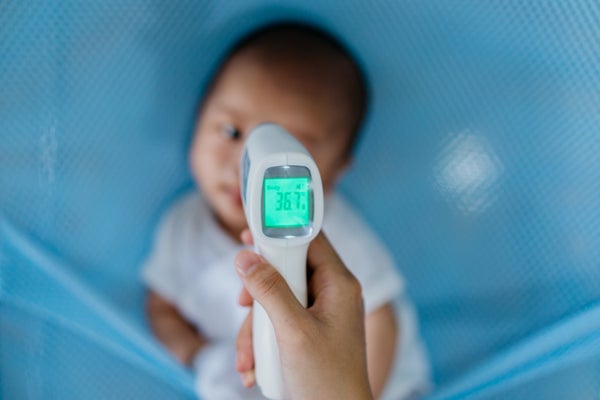
[ad_1]
February 12, 2024
2 min read
Very young children’s developing immune systems respond to the COVID-causing virus SARS-CoV-2 very differently than do those of adults

Many infectious diseases are deadly for both the very old and the very young. But thankfully, the COVID-causing SARS-CoV-2 virus rarely triggers serious illness in infants. Scientists have several theories as to why. For example, some evidence suggests babies’ immature immune systems—which lack the more targeted (or “adaptive”) responses that develop with age—mount a stronger first-line (or “innate”) response against the virus.
Now researchers have profiled the entire immune system in young children to compare their response to SARS-CoV-2 with that of adults. The results, published in Cell, show that infants’ systems mount a strong innate response in their noses, where the airborne virus usually enters the body. And unlike adults, babies don’t exhibit widespread inflammatory signaling throughout their circulatory system, perhaps preventing severe COVID.
The research team, led by Stanford Medicine immunologist Bali Pulendran, took blood samples from 81 infants (54 of whom became infected with the virus between one month and three years of age) and dozens of adults. The researchers also took weekly nasal swabs from kids and adults with and without COVID. They then analyzed proteins and gene activity in these samples to track participants’ innate and adaptive immune responses to the virus. “This sort of longitudinal mapping of the immune response of infants, to any virus, had not been done before,” Pulendran says.
On supporting science journalism
If you’re enjoying this article, consider supporting our award-winning journalism by subscribing. By purchasing a subscription you are helping to ensure the future of impactful stories about the discoveries and ideas shaping our world today.
The team found stark differences between children and adults in both adaptive and innate immune responses. Infected infants’ noses were flooded with inflammatory signaling molecules and cells. But unlike in the adults, there were no signs of inflammation in their blood. “There was this dichotomy between a raging war in these babies’ noses and what’s going on in the blood,” Pulendran says.
“It suggests children have local control of the virus without systemic inflammation, and that’s why we don’t see severe disease [in them],” says pulmonologist Carmen Mikacenic of the Benaroya Research Institute in Seattle, who studies immune responses in the lungs.
Even without a widespread innate response, young children had surprisingly long-lasting levels of SARS-specific antibodies in their blood, Pulendran says. Future research revealing how these innate and adaptive responses are linked could eventually help improve nasally delivered vaccines for children and, potentially, adults.
A crucial question remains: What makes SARS-CoV-2 different from other respiratory viruses, such as influenza and respiratory syncytial virus, which are more deadly for infants? “If we can understand this protection in young children, could we harness it for other viruses they face?” asks Bria M. Coates, a pediatrician and assistant professor at Northwestern University’s Feinberg School of Medicine, who studies kids’ innate immune responses to flu and RSV. Pulendran and his colleagues are now conducting similar analyses for other viruses; that work is “very much ongoing,” he says.
[ad_2]